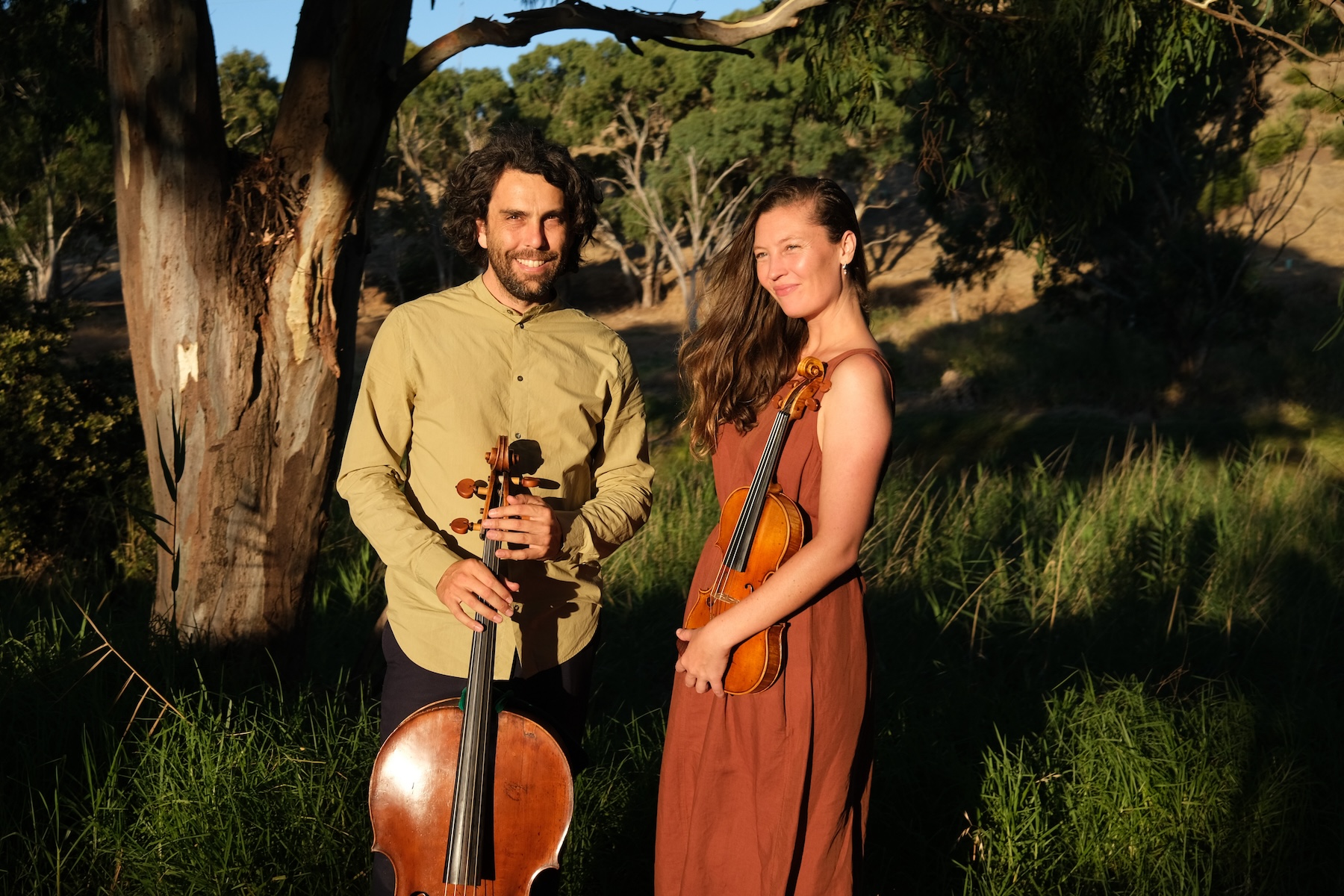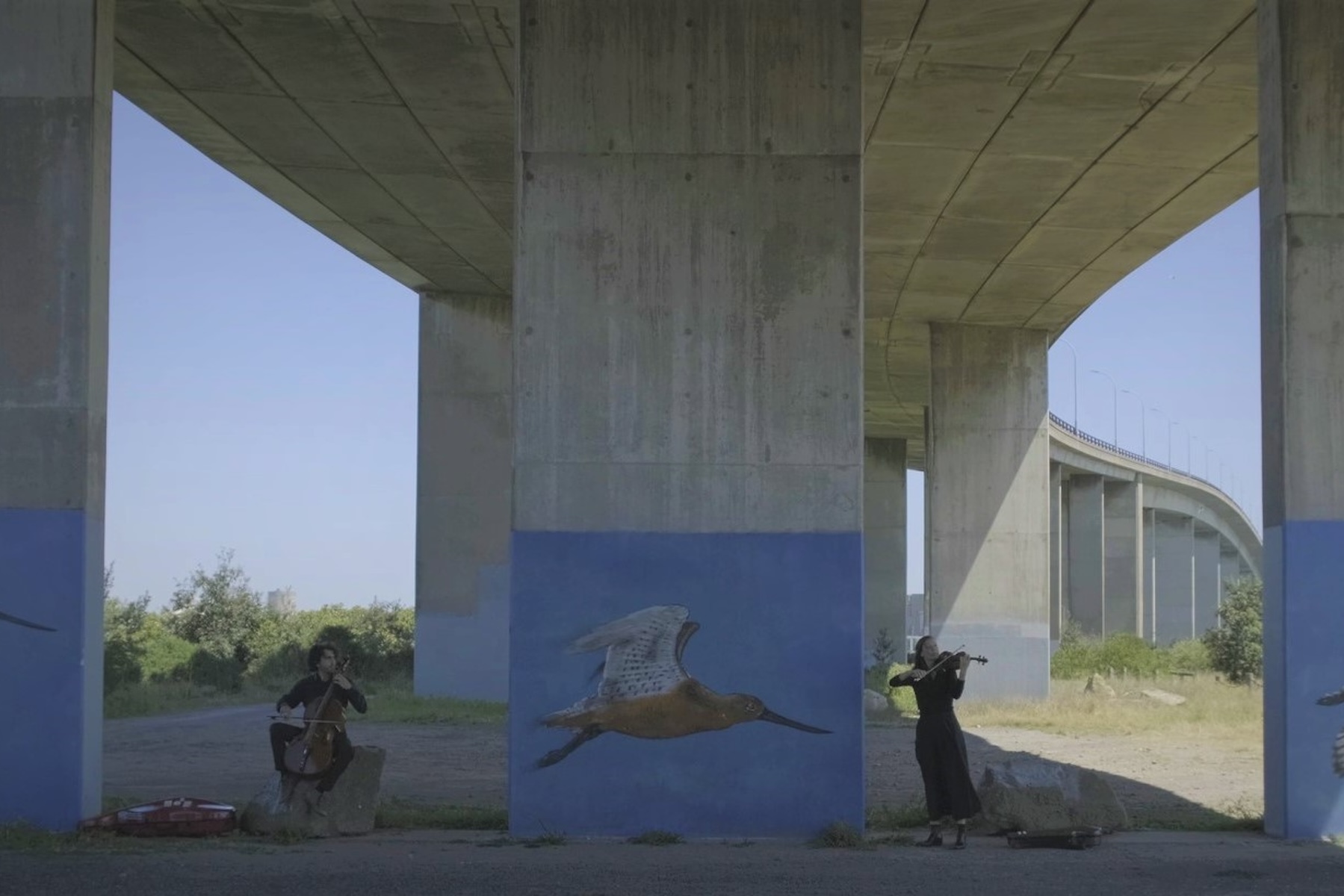‘There is a lot to be grieving’: The Bowerbird Collective embrace Emily Dickinson and nature
Anthony Albrecht and Simone Slattery’s The Bowerbird Collective return for a set of outdoor Nature Festival concerts centring poetry, hope, and reconnection with the natural world.

When Anthony Albrecht and I connect over Zoom, it doesn’t take long before the cellist and Bowerbird Collective co-founder starts reciting poetry.
There’s a good reason: his group’s upcoming Nature Festival performance draws its title from the opening line of American poet Emily Dickinson’s breathtaking 1861 poem:
‘Hope’ is the thing with feathers
That perches in the soul,
And sings the tune without the words,
And never stops at all…
“It’s an absolutely beautiful series of lines,” Albrecht says after reading aloud the first verse, his gentle, somewhat mesmerising voice sound-tracking our early morning conversation.
“There’s an innocence and a kind of simple, just beautiful, evocation of connection with the elemental things and the life forces of the world there.”
It’s also an apt description of the moving productions he and violinist Simone Slattery create as The Bowerbird Collective, prolifically making “art for nature” since forming in 2017.
Weaving live music with multimedia and nature in the service of conservation, biodiversity and environmental connection, the duo have, with good reason, become staples of South Australia’s Nature Festival. Albrecht says it’s the Collective’s sixth time performing in the annual program, which in 2025 encompasses over 300 events that seek to “shift our cultural narrative around nature.”
You might like

They’re in good company to ‘jam’ with the natural world on Kaurna land.
“South Australian composer Jodie O’Regan has set that poem to music,” Albrecht explains. “It’s a really beautiful work for soprano and strings.”
With Anthony and Simone providing the strings, the soprano part comes courtesy of California-based Bethany Hill. “She’s a dear old friend,” Albrecht says. “We’re really excited that the stars aligned for her to be in the country for this year’s festival.”
Anthony says the repertoire will feature music from across the centuries including Classical, Baroque, and new original compositions alongside “amazing” UK folk singer Karine Polwart.
“It’s a really diverse program. I think it will flow seamlessly from one piece to the next,” he says, adding that, “A lot of early Baroque music was actually written for performance in outdoor spaces. A lot of the songs are particularly evocative in that context.”
Famous for their love of birdsong – with multimedia performance Where Song Began and “chart-topping” album Songs of Disappearance endearing the Collective to music lovers and ‘twitchers’ worldwide – this year’s Nature Festival concerts promise to take audiences “into forests, under water and across the lands.”
Sans ‘artificial’ visuals or soundscapes, the first will be in the iconic gardens of Carrick Hill House under early night skies; the second an afternoon performance inside the Top House at Coriole Vineyards, near Onkaparinga River National Park. Albrecht says these outdoors settings offer audiences a unique experience.
Subscribe for updates
“There’s always something magical about performance in a natural space where the intention is for people is to be able to absorb both what’s happening musically and what’s happening naturally around them.
“Last year [at Carrick Hill] we had extraordinary moments with a flock of yellow-tailed black cockatoos flying over, and various honeyeaters, wattlebirds, lorikeets just creating quite an incredible soundscape.”
While “intentionally” creating beauty, pleasure and connection for audiences, there’s also a deeper, more compassionate aspect to Albrecht and Slattery’s work that invites an ‘embodied’ kind of listening.
It reminds us that we’re intrinsically part of the natural world – and how easily this can be forgotten.
I ask Anthony about this more ‘visceral’ side to Bowerbird Collective’s work, and whether an element of activism also informs their work.
“Yeah, it’s a very important question,” he reflects. “And when you combine that with the storytelling capacity of music, where ideas can become associated with emotions, we definitely feel that that’s an opportunity to hopefully inspire action.

“As you say, fundamentally, we are all a part of nature, and yet we mostly behave as though we are not.
“But really, we all have capacity to contribute to building better relationships between the human species and nature. As we once were seamlessly integrated with biodiversity and our biospheres, we are not anymore.
“But we’re an incredibly resourceful, passionate and compassionate species, who can be easily given a sense of our capacity to make meaningful changes in our lives that can lead us into a better place.
Albrecht says that his and Slattery’s work as The Bowerbird Collective often feels a “sense of responsibility” to make a contribution – something he says shouldn’t necessarily be considered ‘exceptional’.
“It’s just quite simple: every person on earth has got to take responsibility for ensuring that we move towards a better relationship with this place that sustains us.
“There is a lot to be grieving at the moment in all sorts of different contexts, but particularly with the enormous environmental challenges, even here in South Australia right now,” Albrecht says, referring to South Australia’s ongoing algal bloom crisis. “But hope is an absolutely essential ingredient.
It’s really special to have a community of like-minded people around us, and to feel like we are bringing more people into that space.”
The Bowerbird Collective will perform Hope is the thing with feathers on Saturday October 4 at Carrick Hill and Sunday October 5 at Coriole Vineyards as part of Nature Festival 2025
Want to see more stories from InDaily SA in your Google search results?
- Click here to set InDaily SA as a preferred source.
- Tick the box next to "InDaily SA". That's it.
Free to share
This article may be shared online or in print under a Creative Commons licence

